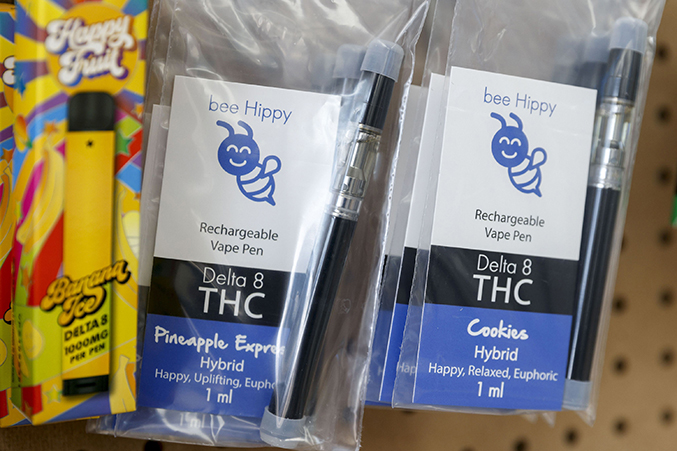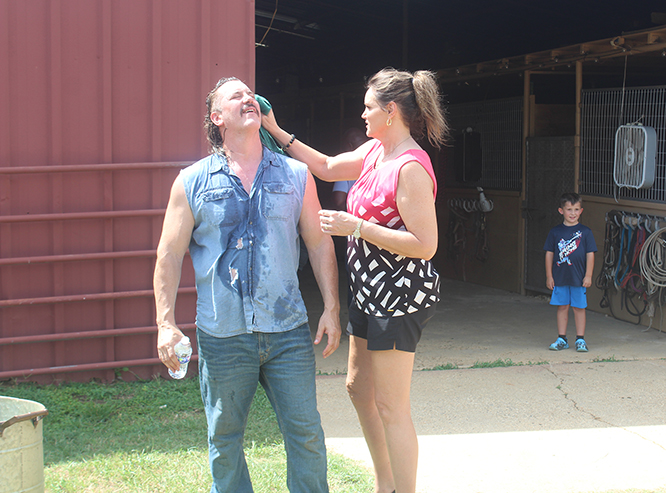THC ban advances again in Texas Senate, a month after Abbott’s veto
Published 10:46 pm Tuesday, July 22, 2025
AUSTIN — A near-total ban on consumable hemp-based THC products advanced in a key Texas Senate panel Tuesday, in apparent defiance of Gov. Greg Abbott who last month told lawmakers he wanted them to regulate the $8 billion industry, not outlaw it.
Senate Bill 5, by Sen. Charles Perry, R-Lubbock, would criminalize gummies, vapes, drinks, snacks and smokable flowers containing any amount of tetrahydrocannabinol, the psychoactive compound in cannabis plants, including marijuana and hemp.
The legislation passed the Senate State Affairs Committee on a 10-0 vote after more than five hours of testimony.
Trending
“I hate this problem that I take somewhat personal responsibility for,” said Perry, who authored the 2019 state farm legislation that allowed the THC market to flourish. “This ship was coming whether we wanted to admit it or not. I thought we could get ahead of it … but we are here today, and we don’t regulate things well, and there’s no way to get here from today’s vantage point on regulation of this stuff. There’s not. It’s not practical, we can’t entertain it. It’s not possible.”
Abbott, a Republican, vetoed a similar ban in late June and ordered lawmakers back to the drawing board, saying the bill that passed in the waning days of the regular session harmed the state’s agricultural industry and was in opposition to federal 2018 farm legislation that legalized hemp products.
He proposed regulating the low-dose hemp-based intoxicating products similarly to the way Texas regulates alcohol: Optional for counties, age limits, open-container laws, and other restrictions like those enforced by the Texas Alcoholic Beverage Commission.
Legislation regulating the industry is expected to be filed later this week by House Republicans, according to advocates.
“Governor Abbott has been clear that Texas must do all we can to protect the lives of children while protecting the liberty of adults,” Abbott spokesman Andrew Mahaleris said in a statement.
Adults should have access to “heavily regulated, nonintoxicating levels of hemp,” while the state maintains “strict legal enforcement” of limits on dosage and concentration of THC in those products to 3 grams, banning synthetic THC and prohibiting all hemp products for those under age 21, he said in the statement.
Trending
In an interview published Tuesday with The Texan, Abbott said suggestions by Lt. Gov. Dan Patrick and others that his veto means he wants to legalize marijuana are “absurd.”
Marijuana laws should stay in place, THC products should be kept out of the hands of kids, and the products that are allowed should be high-quality, non-synthetic and safe, he said.
“I’m not in favor of a total ban,” Abbott told The Texan. “The goal is to pass legislation that will do the most to protect lives, but also protecting the liberty, especially, of adults.”
SB 5 would keep legal the non-intoxicating hemp-based compounds cannabidiol (CBD) and cannabigerol (CBG). The proposal includes protections over hulled hemp seeds, protein powder and hemp oil which are not psychotropic and are currently widely available.
It also makes good on promises by Patrick, a Republican, to continue his fight to shut down an industry he believes is illegal, disreputable, and dangerous – in spite of Abbott’s clear opposition to outlawing it.
The hemp-based consumables market blossomed after the state passed its own version of the federal farm bill in 2019 that failed to stipulate any prohibition on the myriad THC compounds, such as the popular THC-A, that can be sold in potato chips, gummies and soft drinks, among other products.
Republicans on the committee called the retailers “liars” who exploited loopholes, put stores near schools, marketed to kids and ignored the responsibility they had to make sure they were selling safe products. Retailers accused them of pandering to the pharmaceutical and alcohol lobbies.
Tuesday’s tense hearing echoed a battle that has been going on in the halls of the Texas Capitol in the past year, intensifying as the industry has grown to some 8,500 licensed retailers selling hemp-based THC products.
“My last question, and it’s a one-word answer,” Sen. Bob Hall, R-Edgewood, asked a panel of three law enforcement officials and a pediatrician. “Regulate? Or ban?”
Regulating it, prohibition advocates say, would be expensive, complicated, and difficult to enforce – effectively legalizing THC in a state where lawmakers have never agreed to do that and voters have never been asked the question.
Age limits and packaging restrictions have not kept alcohol out of the hands of children, but banning alcohol is not an option, ban supporters testified Tuesday.
A ban, they said, is the only answer.
“You cannot give me enough money to be able to manage this problem,” said Allen Police Chief Steve Dye, testifying Tuesday in favor of the bill on behalf of the Texas Police Chiefs Association. “No amount of personnel or resources in a state this large, with this many locations, will ever be effective in regulating these dangerous products, which is why a ban is the only viable solution to protect our community from these harmful products.”
Parents and medical professionals testified about cases in which teens had become addicted to THC vapes, developed mental problems, and had few options for recovery.
“It’s very hard to treat,” said Dr. Lindy McGee, a Houston-area pediatrician, said during testimony on behalf of the Texas Pediatric Society. “These products significantly raise the risk of psychosis, suicide attempts and self-harm, especially in youth with underlying mental health conditions, and especially with the use of these high-dose products.
“We all know that we have an epidemic of mental-health issues in our children and adolescents right now. This is not helping,” McGee said.
Banning the entire industry, however, would remove access to products many believe have health benefits when used properly, bill opponents say.
Earlier this year, the state expanded its medical marijuana program to include more dispensaries and other measures to lower costs and broad access to those treatments, but many hemp-based THC advocates say the program is still too narrow.
On Tuesday, several veterans and private citizens testified against the ban, saying medical marijuana costs several times more than milder hemp-derived products they use to sleep, calm anxiety and depression, and kill headaches, among other benefits.
Some suggested their rights to medical alternatives were being sacrificed so that competing industries, such as medical marijuana, could thrive and contribute to political campaigns.
“We’re not about getting high. No one’s sitting around getting high, and that remark is, frankly, hard to comprehend,” said Mitch Fuller, legislative director of the Texas VFW. “This (ban) is about the pharmaceutical lobby. This is about the alcohol lobby. This is about the restaurant lobby.”
Retailers argued that the majority of manufacturers and sellers follow federal and state standards and go beyond laws by regulating their own businesses, refusing to sell to children, and gate-keeping their products for safety and quality.
“I’m one of the very first manufacturers in the state. I hold a retail license, a producer license, a processing license, a manufacturing license. I’ve spent hundreds of thousands of dollars on testing. I have a dispensary. I do everything by the book,” said Wyatt Cole, co-founder of Wyatt Purp LLC, who promised to challenge a ban in federal court.
“Everything that’s been painted here is wrong, false, and it’s just a high technology to give to state-funded narcotics monopolies. And I don’t understand how this is legal, or the audacity of you guys to even attempt to do these horrible things.”







